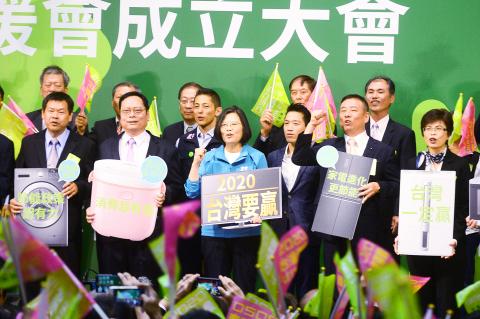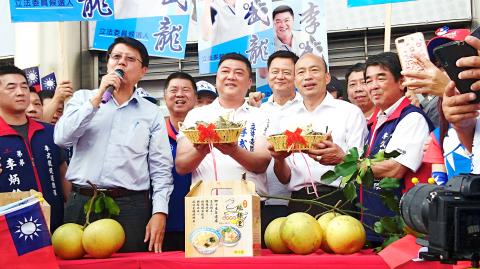Campaigning for next year’s presidential and legislative elections is heating up, with the nation’s biggest two political parties stepping up efforts to rally their support bases.
Looking toward a second term, President Tsai Ing-wen (蔡英文) of the Democratic Progressive Party (DPP) yesterday told a campaign event in Taipei that she hopes to see a high turnout rate and votes for the party on Jan. 11.
“We want to show the world the will, values and choice of the Taiwanese public,” Tsai said, adding that every day until election day is critical and that “everyone should unite and protect Taiwan.”

Photo: Wang Yi-sung, Taipei Times
“I do not want to see the public divided because of the election,” she added, calling for people across the political spectrum — regardless of their support for Taiwanese independence, the Republic of China (Taiwan) or others — to set aside their differences.
“Our election should be a process of banding together and showing the world that Taiwan is not only resolved, but also united in defending its sovereignty and democracy,” Tsai said.
Comparing the process of national development to that of building a house, the president asked the crowd to not “change the blueprint in the middle of construction” and appealed for their support for another term in office.

Photo: Yang Chin-cheng, Taipei Times
Separately yesterday, Kaohsiung Mayor Han Kuo-yu (韓國瑜), the Chinese Nationalist Party’s (KMT) presidential candidate, embarked on a two-day trip to canvass votes in Tainan, a traditional stronghold of the DPP.
Han told the crowd at a campaign event that Taiwanese have had it rough over the past few years and they should change their fates through their ballots.
Han — who was also stumping for Lee Wu-lung (李武龍), the KMT legislative candidate for Tainan’s Madou District (麻豆) — said that should he and Lee be elected, they would serve the public and not be driven by a desire for power.
Farmers, fishers, workers and other ordinary people constitute the backbone of society, Han said, adding that if they “lead prosperous lives, then everyone in Taiwan would enjoy prosperity.”
Farmers and fishers are not reaping the benefits of their hard work, as their produce and fisheries products have no sales channels, or are being sold at a fraction of their actual worth, he said.
Taiwanese must realize that no political party should be above the public — it should be the other way around, Han said.
People’s support for political parties should not be fixed, but rather given to parties that do well, and those that fail should withdraw, he said.
“The people of Tainan should wake from their dreams,” Han said, adding that if they want a highly efficient government, the promise of economic development, effective educational policies and strong foreign affairs, they should vote for him.
Additional reporting by Yang Chin-cheng

US President Donald Trump said "it’s up to" Chinese President Xi Jinping (習近平) what China does on Taiwan, but that he would be "very unhappy" with a change in the "status quo," the New York Times said in an interview published yesterday. Xi "considers it to be a part of China, and that’s up to him what he’s going to be doing," Trump told the newspaper on Wednesday. "But I’ve expressed to him that I would be very unhappy if he did that, and I don’t think he’ll do that," he added. "I hope he doesn’t do that." Trump made the comments in

NOT AN OPENING: Trump’s violation of international law does not affect China’s consideration in attacking Taiwan; Beijing lacks capability, not precedent, an official said Taiwanese officials see the US’ capture of the president of Venezuela as a powerful deterrent to Beijing’s aggression and a timely reminder of the US’ ability to defeat militaries equipped with Chinese-made weapons. The strikes that toppled Venezuelan President Nicolas Maduro signaled to authoritarian leaders, including Chinese President Xi Jinping (習近平), US President Donald Trump’s willingness to use military might for international affairs core to US interests, one senior official in Taipei’s security circle said. That reassured Taiwan, the person said. Taipei has also dismissed the idea that Trump’s apparent violation of international law could embolden Beijing, said the official, who was not

A cold surge advisory was today issued for 18 cities and counties across Taiwan, with temperatures of below 10°C forecast during the day and into tonight, the Central Weather Administration (CWA) said. New Taipei City, Taipei, Taoyuan and Hsinchu, Miaoli and Yilan counties are expected to experience sustained temperatures of 10°C or lower, the CWA said. Temperatures are likely to temporarily drop below 10°C in most other areas, except Taitung, Pingtung, Penghu and Lienchiang (Matsu) counties, CWA data showed. The cold weather is being caused by a strong continental cold air mass, combined with radiative cooling, a process in which heat escapes from

Snow this morning fell on Alishan for the first time in seven years, as a strong continental cold air mass sent temperatures plunging across Taiwan, the Central Weather Administration (CWA) said. The Alishan weather station, located at an elevation of about 2,200m in central Taiwan, recorded snowfall from 8:55am to 9:15am, when the temperature dropped to about 1°C, the CWA said. With increased moisture and low temperatures in the high-altitude Alishan area, the conditions were favorable for snow, CWA forecaster Tsai Yi-chi (蔡伊其) said. The last time snow fell at the Alishan weather station was on Jan. 10, 2018, while graupel fell there